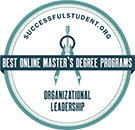
M.A. in Organizational Leadership – Interdisciplinary Studies
Customize Your Degree. Create Your Niche with an Interdisciplinary Studies Program.
Become the specific type of leader you think the world needs. Self-design your course lineup from a broad spectrum of subject areas—all taught from a Christian perspective. Your Master of Arts in Organizational Leadership (MAOL) — Interdisciplinary Studies program can give you practice solving problems in real-life situations. There are no GMAT/GRE requirements. You can gain advice from seasoned business professionals through the Executive Mentor Program. Regent has been ranked among top national universities by the U.S. News & World Report, 2023, and has also been ranked as a Top 10 Military Friendly® School by Military Friendly®, 2023-24. Align yourself with excellence.
Careers | Other Concentrations | Courses | Admissions | Tuition
FOCUS ON YOUR PASSION IN AN INTERDISCIPLINARY STUDIES GRADUATE PROGRAM
Enjoy three elective courses from any school at Regent University that align with your career goals. Courses must have an obvious tie to leadership and/or organizational development. Must be approved by an advisor.
IMPROVE YOUR MARKETABILITY
Master the organizational leadership skills employers are seeking, including motivation, creativity, vision, strategic planning, and technology.
INSPIRE OTHERS THROUGH SERVANT LEADERSHIP
Gain expertise to motivate teams and confidently guide those you lead and serve.
You will learn key organizational leadership elements such as ethics, motivation, creativity, vision, strategic planning, and teamwork from our award-winning faculty.
MAOL-Interdisciplinary Studies Career Opportunities
After completing your MAOL in Interdisciplinary Studies, you can:
- Create a plan to train and enrich your employees from orientation to executive development.
- Apply organizational leadership elements in ethics, motivation, creativity, vision, strategic planning, teamwork, group development, technology, and organizational development.
- Integrate a global outlook that improves cultural competence and values the commonalities and uniqueness among employees.
Career Opportunities
Administration, management & leadership in a variety of roles, based on your career objectives.
2023-24 Semester Check-In Deadlines
All students are expected to check-in for the semester two weeks before the session start date. Students should apply, be accepted, enroll in their first courses, and confirm a plan to pay for their courses prior to this date.
| Session | Semester Check-In | Session Start Date |
|---|---|---|
| Session A | Friday, August 11 | Monday, August 21 |
| Session M | Friday, September 8 | Monday, September 18 |
| Session B | Friday, October 13 | Monday, October 23 |
| Session C | Thursday, January 4 | Monday, January 8 |
| Session T | Friday, January 26 | Monday, February 5 |
| Session D | Friday, March 1 | Monday, March 11 |
| Session E | Friday, April 26 | Monday, May 6 |
| Session F | Friday, June 7 | Monday, June 17 |
Admissions Requirements
Step 1: Apply to Regent University
Submit your application using the Regent University Online Application.
Note: If you are unable to complete our application due to a disability, please contact our Admissions Office at 757.352.4990 or admissions@regent.edu and an admissions representative will provide reasonable accommodations to assist you in completing the application.
Step 2: Submit Your Unofficial Transcripts
Submit your unofficial transcripts to regent.edu/items.
Upon submitting your application, you will receive an email requesting authorization for Regent University to obtain your official transcripts from your U.S. degree-granting institution. International transcripts must be evaluated by a NACES, AACRAO or NAFSA approved agency.
Step 3: Submit Your Government-Issued ID
To ensure academic integrity, Regent University requires a copy of a government-issued ID. Please submit a scanned copy or photograph of it to regent.edu/items.
Please feel free to contact the Office of Admissions at 757.352.4990 or admissions@regent.edu should you have any further questions about the application process.
Note: All items submitted as part of the application process become the property of Regent University and cannot be returned.
PART-TIME STUDENTS
| Degree | Tuition Cost Per Credit Hour | Average Credit Hours Per Semester | Average Tuition Per Semester |
|---|---|---|---|
| Master of Arts (MA) / Master of Science (MS) | $695 | 6 | $4,170 |
| Master of Business Administration (MBA) | $695 | 6 | $4,170 |
| Doctor of Business Administration (DBA) | $1,020 | 3 | $3,060 |
| Doctor of Philosophy in Organizational Leadership (PhD) | $1,020 | 3 | $3,060 |
| Doctor of Strategic Leadership (DSL) | $1,020 | 3 | $3,060 |
Full-Time Students
| Degree | Tuition Cost Per Credit Hour | Average Credit Hours Per Semester | Average Tuition Per Semester |
|---|---|---|---|
| Master of Arts (MA) / Master of Science (MS) | $695 | 9 | $6,255 |
| Master of Business Administration (MBA) | $695 | 9 | $6,255 |
| Doctor of Business Administration (DBA) | $1,020 | 6 | $6,120 |
| Doctor of Philosophy in Organizational Leadership (PhD) | $1,020 | 6 | $6,120 |
| Doctor of Strategic Leadership (DSL) | $1,020 | 6 | $6,120 |
Student Fees Per Semester
| University Services Fee (On-Campus Students) | $850 (Fall & Spring) $700 (Summer) |
| University Services Fee (Online Students) | $700 |
Part-Time Students
| Degree | Tuition Cost Per Credit Hour | Average Credit Hours Per Semester | Average Tuition Per Semester |
|---|---|---|---|
| Master of Arts (MA) / Master of Science (MS) | $695 | 6 | $4,170 |
| Master of Business Administration (MBA) | $695 | 6 | $4,170 |
| Doctor in Business Administration (DBA) | $1,020 | 3 | $3,060 |
| Doctor of Philosophy in Business (PhD) | $1,020 | 3 | $3,060 |
| Doctor of Philosophy in Organizational Leadership (PhD) | $1,020 | 3 | $3,060 |
| Doctor of Strategic Leadership (DSL) | $1,020 | 3 | $3,060 |
Full-Time Students
| Degree | Tuition Cost Per Credit Hour | Average Credit Hours Per Semester | Average Tuition Per Semester |
|---|---|---|---|
| Master of Arts (MA) / Master of Science (MS) | $695 | 9 | $6,255 |
| Master of Business Administration (MBA) | $695 | 9 | $6,255 |
| Doctor in Business Administration (DBA) | $1,020 | 6 | $6,120 |
| Doctor of Philosophy in Business (PhD) | $1,020 | 6 | $6,120 |
| Doctor of Philosophy in Organizational Leadership (PhD) | $1,020 | 6 | $6,120 |
| Doctor of Strategic Leadership (DSL) | $1,020 | 6 | $6,120 |
Student Fees Per Semester
| University Services Fee (On-Campus Students) | $850 (Fall & Spring) $700 (Summer) |
| University Services Fee (Online Students) | $700 |
*Rates are subject to change at any time. The per-credit-hour tuition rate is for SBL master’s level courses only. Concentration courses taken from the other schools at Regent University are charged at that school’s tuition rate.




